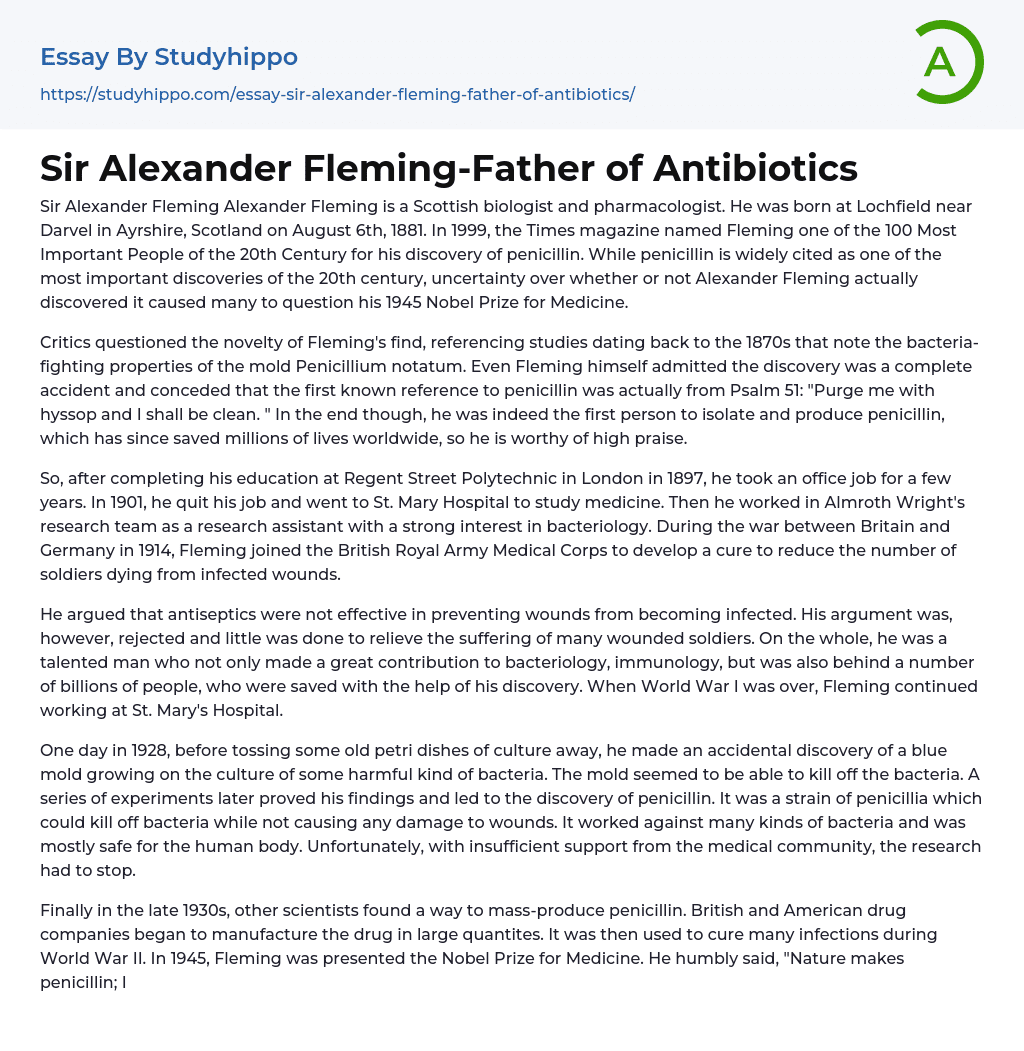

Sir Alexander Fleming-Father of Antibiotics Essay Example
Sir Alexander Fleming, a Scottish biologist and pharmacologist, was born at Lochfield near Darvel in Ayrshire, Scotland on August 6th, 1881. He was named one of the 100 Most Important People of the 20th Century by the Times magazine in 1999 for his discovery of penicillin. However, doubts have been raised about his actual role in discovering penicillin and this uncertainty has cast doubt on his Nobel Prize for Medicine in 1945. Penicillin is widely acknowledged as one of the most significant discoveries of the 20th century.
Critics raised concerns about the originality of Fleming's discovery, citing previous studies from the 1870s that acknowledged the antimicrobial properties of Penicillium notatum mold. Fleming himself admitted that his finding was a fortunate accident and recognized that the first mention of penicillin actually came from Psalm 51: "Purge me with hysso
...p and I shall be clean." However, he was the first to isolate and produce penicillin, which has subsequently saved countless lives worldwide. Therefore, he deserves high praise. After completing his education at Regent Street Polytechnic in London in 1897, Fleming spent a few years working in an office. In 1901, he resigned from his job and joined St.
Mary Hospital was the institution where he pursued his medical studies before becoming a research assistant in Almroth Wright's team, with a strong focus on bacteriology. In 1914, during the war between Britain and Germany, Fleming enlisted in the British Royal Army Medical Corps with the intention of discovering a remedy to reduce deaths resulting from infected wounds. Despite his belief that antiseptics were ineffective in preventing such infections and his plea being disregarded with little aid provided to injured soldiers,
Fleming managed to make substantial advancements in bacteriology and immunology. Ultimately, it was through his revolutionary finding that he saved countless lives amounting to billions.
Following World War I, Fleming continued working at St. Mary's Hospital. In 1928, during the process of disposing old petri dishes containing a culture of harmful bacteria, he unexpectedly discovered a blue mold growing on one. Surprisingly, this mold had the capacity to eradicate the bacteria. Additional experiments validated his findings and eventually resulted in the groundbreaking discovery of penicillin.
Despite the lack of support from the medical community, a strain of penicillia that could kill bacteria without harming wounds was discovered. Regrettably, this discovery was discontinued. Yet, in the late 1930s, scientists successfully developed a method for mass producing penicillin. Consequently, British and American pharmaceutical companies began manufacturing substantial quantities of this medication.
During World War II, Penicillin was utilized for treating different infections and this breakthrough resulted in Sir Alexander Fleming receiving the Nobel Prize for Medicine in 1945. In a humble manner, he acknowledged, "Nature creates penicillin; I merely discovered it." Besides his two marriages, Fleming had one son and devoted the rest of his career to St.
Mary's Hospital was where he stayed until his death in 1955 from a sudden heart attack. Due to this individual, it is certain that our world has become slightly safer and our losses are not as devastating as they could have been 90 years ago. Many believe that this discovery would have a significant impact on history.
Fleming's discovery led to the emergence of a large pharmaceutical industry by the mid-century, producing synthetic penicillins that would successfully combat ancient diseases such as syphilis, gangrene,
and tuberculosis.
- Hospital essays
- Physician essays
- Health Care Provider essays
- Universal Health Care essays
- Readmission essays
- Cloning essays
- Medical Ethics essays
- Patient essays
- Therapy essays
- drugs essays
- Cannabis essays
- Aspirin essays
- Cardiology essays
- Hemoglobin essays
- Pharmacology essays
- Surgery essays
- alternative medicine essays
- Plastic Surgery essays
- Organ Donation essays
- Vaccines essays
- Medical essays
- Dentist essays
- Psychological Trauma essays
- Physical therapy essays
- Cold essays
- Cocaine essays
- Why Marijuana Should Be Legalized essays
- Drug Abuse essays
- Teenage Drug Abuse essays
- Heart Disease essays
- Artery essays
- Adoption essays
- Aunt essays
- Babies essays
- Bedroom essays
- Caring essays
- Children essays
- Daughter essays
- Divorce essays
- Dog essays
- Dysfunctional Family essays
- Family Tradition essays
- Family Values essays
- Father essays
- Foster Care essays
- Friends essays
- Grandparent essays
- Home essays
- Hometown essays
- Husband essays



